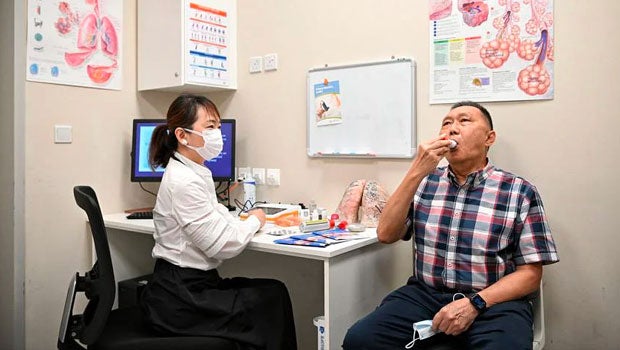
Mr Orson Lim (right), who has severe asthma, with Associate Professor Mariko Koh from Singapore General Hospital. ST PHOTO: KUA CHEE SIONG
SINGAPORE - Diagnosed with severe asthma four years ago, Mr Orson Lim often found himself breathless and waking up gasping for air at least once a month.
"I felt like a fish out of water," said the 72-year-old, who previously worked in the logistics industry.
Like Mr Lim, people with severe asthma suffer frequently from symptoms such as breathlessness and wheezing. Some may even miss work or find it difficult to sleep because of this condition.
But they will one day benefit from the Singapore Severe Asthma Registry (SSAR), a database on severe asthma patients which aims to understand more about the condition, provide more effective treatments and improve severe asthma care here.
SSAR was set up in April by a research network formed by Nanyang Technological University's Lee Kong Chian School of Medicine (LKCMedicine), Changi General Hospital, Singapore General Hospital (SGH) and Tan Tock Seng Hospital.
The data collected, which is anonymous, includes patients' medical history, the treatment they receive, how they are affected by the condition and their asthma attack history.
The information can help, for instance, in research on more effective treatments, such as biological therapy.
Currently, taking steroids orally is one of the most common treatments for severe asthma, said Associate Professor Mariko Koh, a senior consultant in the Department of Respiratory and Critical Care Medicine at SGH who also chairs SSAR.
"Patients on long-term oral steroids have higher risk of stroke, heart diseases, osteoporosis and diabetes," she said. "It should be used as a treatment of last resort."
The data can also help researchers understand how high steroid usage affects patients here and come up with ways to cut usage, she added.
Managed by The Academic Respiratory Initiative for Pulmonary Health (Tariph), the registry has collected data from 139 patients and aims to register 200 patients by year end.
SSAR has joined its global counterpart, the International Severe Asthma Registry, and allow researchers to compare data of Asian and non-Asian patients.
Currently, guidelines used to treat patients are mostly based on data from non-Asian patients, said Associate Professor Sanjay Chotirmall, Tariph's co-chairman, LKCMedicine's assistant dean for faculty affairs, and provost's chair in molecular medicine.
"There is a huge gap and need for more data in Asian patients," he said. "This is important because Asian patients act differently. We have different climates, genetics, geography, cultures and healthcare systems, and how the patient interacts with all of those factors plays a role in the outcomes of disease."
By being part of the international registry, which contains data from 12,772 patients from 26 countries, researchers get access to rich data to improve severe asthma care here, he added.
Meanwhile, Mr Lim, who is now a part-time security trainer, said he has not experienced an asthma attack since he started seeing a specialist more than three years ago.
Those suffering from severe asthma should seek proper help and be patient with their condition, he said.













 Get it on Google Play
Get it on Google Play